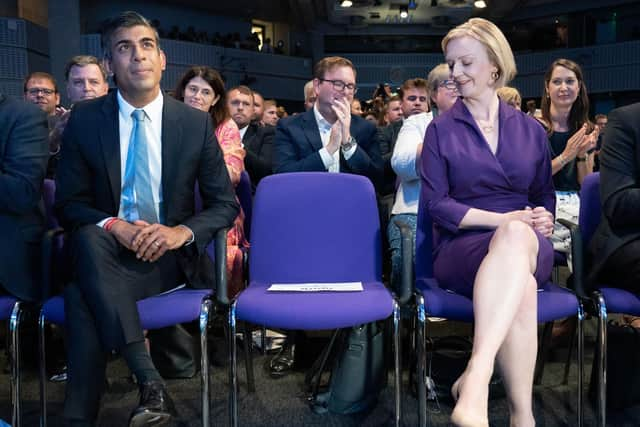Why didn’t Tory members like Rishi Sunak and why do they continue to hold out against him? - David Behrens
Yet despite the superficial show of support from his fair-weather friends in Westminster, the elevation of Rishi Sunak to Number 10 without a mandate from party members, let alone the rest of us, was not welcomed universally within Conservative ranks.
The party’s unilateral action left grassroots members feeling as if they had been used, complained the chairman of the local Tory party in Telford. Another party loyalist publicly ripped up his membership card, saying that by selecting Mr Sunak only six weeks after he had lost to Liz Truss, MPs were ignoring the stated wishes of the rank and file.
Advertisement
Hide AdAdvertisement
Hide AdThis was, to put it mildly, a blinkered view of events. There was only one requirement of the new Prime Minister and that was not to be Ms Truss. You didn’t have to be an economist to work that out.


So why the fuss? No-one was seriously arguing that the former PM deserved time to demonstrate her incompetence more fully – especially not after the previous week’s chaotic vote on fracking, a spectacle that was conducted with all the decorum of chucking-out time at Wetherspoons.
No, what was irking the grumbling grassroots members was being denied their 15 minutes of fame, their chance to play kingmaker once more. It costs £25 a year to join the party and one of the few perks is the right to vote in leadership elections. That’s what they’d signed up for and they wanted their money’s worth.
It’s not a phenomenon unique to the Tories; Labour’s ranks were famously – and temporarily – swelled by people who joined for the express purpose of electing Jeremy Corbyn. But there was a different dimension to the Truss-Sunak standoff: why did so many members vote against the candidate who was clearly the better qualified? Why didn’t they like Rishi Sunak and why do they continue to hold out against him? Let’s not kid ourselves about the answer to that.
Advertisement
Hide AdAdvertisement
Hide AdTheir collective decision to send Liz Truss to Downing Street made them a liability this time around, and the party could not risk another debacle. So it was inevitable that the Westminster branch would try to engineer them out of the equation. A few torn-up membership cards in Telford was a small price to pay.
The outgoing PM, meanwhile, seemed oblivious to the scale of her failure as she exited Number 10 with an off-the-peg internet quote from the Ancient Roman philosopher, Lucius Annaeus Seneca. “It is not because things are difficult that we do not dare,” she parroted. She failed to mention that Seneca was also an advocate of saying sorry. “There is no person so severely punished as those who subject themselves to the whip of their own remorse,” he wrote.
With the whole chapter behind us – though not its legacy – and Westminster back to the daily grind of hurling insults across the floor, it was almost a relief to find Mr Sunak’s first PM’s Questions dominated by a debate about something that doesn’t matter at all. This was whether the sacked and then un-sacked Home Secretary, Suella Braverman, had breached her workplace IT policy by sending an email from her personal account.
The accusation was that she had failed to use what is known as the Government Secure Intranet for the message in question. But could any opposition MPs explain what that meant?
Advertisement
Hide AdAdvertisement
Hide AdOf course not. Most of them have trouble opening the lid of a laptop. The fact is that any system is secure so long as you don’t leave your messages on screen when you go to the loo, or stick a Post-It note marked ‘password’ under your desk.
Recent history tells us that pursuing this sort of thing is counterproductive. Using an unauthorised email account was what Hillary Clinton was charged with doing before the 2016 election, and the consequence of not letting it drop was the arrival in the White House of Donald Trump. Say what you like about our own system but we realised within a few weeks that we had elected the wrong Prime Minister in Liz Truss; six years on there are Americans who still think Trump isn’t a turnip.
What, though, will we make of our new PM in another six years? Will we even remember him, and if so will it be for his policies or for the curious fashion sense that compels him to wear jackets two sizes too small and his trousers at half-mast?
This much we know: the true test of his character will not be in facing down the back-stabbers who lurk around every corner of the Commons, nor even rescuing the economy. It will be in winning over the hearts and minds of the Tories of Telford.